| Listing 1 - 10 of 54 | << page >> |
Sort by
|
Book
Abstract | Keywords | Export | Availability | Bookmark
 Loading...
Loading...Choose an application
- Reference Manager
- EndNote
- RefWorks (Direct export to RefWorks)
Plato. --- Aflāṭūn --- Aplaton --- Bolatu --- Platon, --- Platonas --- Platone --- Po-la-tʻu --- Pʻŭllatʻo --- Pʻŭllatʻon --- Pʻuratʻon --- Πλάτων --- אפלטון --- פלאטא --- פלאטאן --- פלאטו --- أفلاطون --- 柏拉圖 --- 플라톤 --- Plato --- Platon --- Platoon --- Criticism and interpretation --- Платон --- プラトン
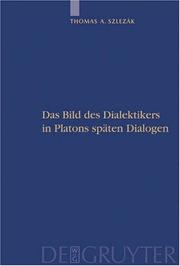
ISBN: 3110181789 9786613396846 128339684X 3110204800 9783110181784 9783110204803 9781283396844 Year: 2004 Publisher: Berlin W. De Gruyter
Abstract | Keywords | Export | Availability | Bookmark
 Loading...
Loading...Choose an application
- Reference Manager
- EndNote
- RefWorks (Direct export to RefWorks)
Die Figur des Dialektikers erscheint in Platons Dialogen unter verschiedenen Namen: 'Sokrates' oder 'Diotima', 'Parmenides' oder 'Gast aus Elea', 'Timaios' oder 'der Athener'. Ungeachtet des Unterschieds der Temperamente, der Rollen und der Situationen führt die Analyse der Art der Gesprächsführung in den späten Dialogen auf ein einheitliches Bild des Dialektikers, das durchaus dem Bild entspricht, das die Analyse der frühen und mittleren Dialoge (in "Platon und die Schriftlichkeit der Philosophie", Teil I 1985) ergab. Der Dialektiker ist dem aktuell geführten Gespräch stets weit voraus. Er entscheidet souverän, welche Fragen weiterverfolgt, welche bewusst aus dem Gespräch herausgehalten werden. Sein Vorauswissen der Lösungen im aktuellen Gespräch macht es sicher, daß er auch die ausgesparten Fragen mit gleicher Überlegenheit behandeln könnte. Das Ausgesparte aber weist immer auf den Bereich der Prinzipien. Der Sinn dieser meist verkannten Figurenkonzeption ergibt sich aus Platons Kritik der Schriftlichkeit im Phaidros: der Dialektiker ist der Denker, hinter dessen Ausführungen eine weiterführende Prinzipienlehre steht. Th. A. Szlezák's book Platon und die Schriftlichkeit der Philosophie. Interpretationen zu den frühen und mittleren Dialogen published in 1985 rapidly became an internationally recognised classic in the interpretation of Plato. A close textual analysis of the Dialogues revealed new insights into the relationship of Plato's textual criticism and his auctorial activity. Following on logically from this, Szlezák now brings the same approach to bear on Plato's late dialogues. With this, he presents the first comprehensive study of Socrates the dialectician in the totality of Plato's work with results which are highly relevant for Plato's concept of philosophy.
Philosophy. --- Mental philosophy --- Humanities --- Plato. --- Aflāṭūn --- Aplaton --- Bolatu --- Platon, --- Platonas --- Platone --- Po-la-tʻu --- Pʻŭllatʻo --- Pʻŭllatʻon --- Pʻuratʻon --- Πλάτων --- אפלטון --- פלאטא --- פלאטאן --- פלאטו --- أفلاطون --- 柏拉圖 --- 플라톤 --- Платон --- プラトン --- Platon --- Plato
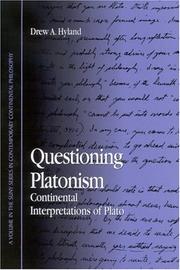
ISBN: 0791461955 Year: 2004 Volume: *12
Abstract | Keywords | Export | Availability | Bookmark
 Loading...
Loading...Choose an application
- Reference Manager
- EndNote
- RefWorks (Direct export to RefWorks)
Philosophy, European --- Plato. --- Aflāṭūn --- Aplaton --- Bolatu --- Platon, --- Platonas --- Platone --- Po-la-tʻu --- Pʻŭllatʻo --- Pʻŭllatʻon --- Pʻuratʻon --- Πλάτων --- אפלטון --- פלאטא --- פלאטאן --- פלאטו --- أفلاطون --- 柏拉圖 --- 플라톤 --- Plato --- Platon --- Platoon --- Philosophy [Modern ] --- Europe --- 20th century --- Платон --- プラトン
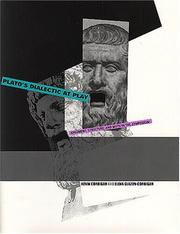
ISBN: 0271024623 Year: 2004
Abstract | Keywords | Export | Availability | Bookmark
 Loading...
Loading...Choose an application
- Reference Manager
- EndNote
- RefWorks (Direct export to RefWorks)
Plato. --- Plato --- Aflāṭūn --- Aplaton --- Bolatu --- Platon, --- Platonas --- Platone --- Po-la-tʻu --- Pʻŭllatʻo --- Pʻŭllatʻon --- Pʻuratʻon --- Πλάτων --- אפלטון --- פלאטא --- פלאטאן --- פלאטו --- أفلاطون --- 柏拉圖 --- 플라톤 --- Literary art. --- Platon --- Platoon --- Literary art --- Платон --- プラトン

ISBN: 0791484556 1423740246 9781423740247 9780791484555 9780791461952 0791461955 Year: 2004 Publisher: Albany, NY State University of New York Press
Abstract | Keywords | Export | Availability | Bookmark
 Loading...
Loading...Choose an application
- Reference Manager
- EndNote
- RefWorks (Direct export to RefWorks)
Given the conception of philosophy held by continental thinkers, and in particular their greater sensitivity to the kinship of philosophy and literature, Drew A. Hyland argues that they should be much more attentive to the literary dimension of Plato's thinking than they have been. He believes they would find in the dialogues not the various forms of "Platonism" that they wish to reject, but instead a thinking much more congenial and challenging to their own predilections.By carefully examining the works of Heidegger, Derrida, Irigaray, and Cavarero, Hyland points to the tendency of continental thinkers to view Plato's dialogues through the lens of Platonism, thus finding Platonic metaphysics, Platonic ethics, and Platonic epistemology, while overlooking the literary dimension of the dialogues, and failing to recognize the extent to which the form undercuts anything like the Platonism they find. The striking exception, Hyland claims, is Hans-Georg Gadamer who also demonstrates the compatibility of the Platonic dialogues with the directions of continental thinking.
Philosophy, European --- Plato. --- Platon --- Plato --- Aflāṭūn --- Aplaton --- Bolatu --- Platonas --- Platone --- Po-la-tʻu --- Pʻŭllatʻo --- Pʻŭllatʻon --- Pʻuratʻon --- Πλάτων --- אפלטון --- פלאטא --- פלאטאן --- פלאטו --- أفلاطون --- 柏拉圖 --- 플라톤 --- Платон --- プラトン --- Philosophy, Modern --- Modern philosophy
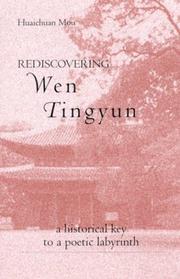
ISBN: 0791485838 1423739310 9781423739319 0791459357 9780791459355 0791459365 9780791459362 9780791485835 9780791485835 Year: 2004 Publisher: Albany State University of New York Press
Abstract | Keywords | Export | Availability | Bookmark
 Loading...
Loading...Choose an application
- Reference Manager
- EndNote
- RefWorks (Direct export to RefWorks)
A new look at the life, times, and work of the great Tang dynasty poet, Wen Tingyun, that rebuts the negative aspects of his reputation. Translations of a number of his works are included.
Wen, Tingyun, --- On, Hikyō, --- On, Teiin, --- Wen, Fei-chʻing, --- Wen, Feiqing, --- Wen, Tʻing-yün, --- Wun, Ting-ün, --- 温庭筠, --- 温飛卿, --- Criticism and interpretation. --- Chinese literature --- History and criticism.
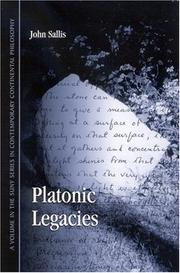
ISBN: 0791484351 9780791484357 0791462374 9780791462379 Year: 2004 Publisher: Albany, NY State University of New York Press
Abstract | Keywords | Export | Availability | Bookmark
 Loading...
Loading...Choose an application
- Reference Manager
- EndNote
- RefWorks (Direct export to RefWorks)
In Platonic Legacies John Sallis addresses certain archaic or exorbitant moments in Platonism. His concern is to expose such moments as those expressed in the Platonic phrase "beyond being" and in the enigmatic word chora. Thus he ventures to renew chorology and to bring it to bear, most directly, on Platonic political discourse and Plotinian hyperontology. More broadly, he shows what profound significance these most archaic moments of Platonism, which remained largely unheeded in the history of philosophy, have for contemporary discussions of spacings, of utopian politics, of the nature of nature, and of the relation between philosophy and tragedy. Thus addressing Platonism in its bearing on contemporary philosophy, Platonic Legacies engages, in turn, a series of philosophers ranging from Nietzsche, Heidegger, and Arendt to certain contemporary American Continental philosophers. These engagements focus on the way in which these recent and contemporary philosophers take up the Platonic legacies in their own thought and on the way in which the exposure of an archaic Platonism can redirect or supplement what they have accomplished.
Platonists. --- Platonism --- Philosophers --- Philosophy, Ancient --- Plato. --- Plato --- Platon --- Aflāṭūn --- Aplaton --- Bolatu --- Platonas --- Platone --- Po-la-tʻu --- Pʻŭllatʻo --- Pʻŭllatʻon --- Pʻuratʻon --- Πλάτων --- אפלטון --- פלאטא --- פלאטאן --- פלאטו --- أفلاطون --- 柏拉圖 --- 플라톤 --- Платон --- プラトン --- Influence.
Periodical
ISSN: 17709687 Year: 2004 Publisher: Paris Les belles lettres
Abstract | Keywords | Export | Availability | Bookmark
 Loading...
Loading...Choose an application
- Reference Manager
- EndNote
- RefWorks (Direct export to RefWorks)
Philosophy, Ancient --- Philosophie ancienne --- Philosophy, Ancient. --- Ancient philosophy --- Greek philosophy --- Philosophy, Greek --- Philosophy, Roman --- Roman philosophy --- Plato --- Platon --- Plato. --- Aflāṭūn --- Aplaton --- Bolatu --- Platon, --- Platonas --- Platone --- Po-la-tʻu --- Pʻŭllatʻo --- Pʻŭllatʻon --- Pʻuratʻon --- Πλάτων --- אפלטון --- פלאטא --- פלאטאן --- פלאטו --- أفلاطون --- 柏拉圖 --- 플라톤 --- Платон --- プラトン --- Periodicals --- Periodicals. --- EJPHILO EPUB-ALPHA-E EPUB-PER-FT REVORG-E
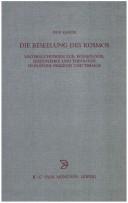
ISBN: 3598778112 3111859339 3110930803 Year: 2004 Volume: 199 Publisher: München Leipzig K.G. Saur
Abstract | Keywords | Export | Availability | Bookmark
 Loading...
Loading...Choose an application
- Reference Manager
- EndNote
- RefWorks (Direct export to RefWorks)
In welchem Verhältnis steht die Seelenlehre zur Kosmologie in Platons Phaidon? Welche Rolle spielen die Schicksale der Seelen in der Ökonomie des Weltalls und wie sind unter diesem Gesichtspunkt die Unsterblichkeitsbeweise des Phaidon zu lesen? Das Ineinander von Seelenlehre und Kosmologie im Phaidon weist auf den späten Timaios mittels der Deutung der Worte theoi theon aus der Ansprache des Demiurgen an die jungen Götter. Es folgt eine umfassende Studie über die Bewegungslehre des Timaios, die eine systematische Interpretation der Kosmologie dieses Dialoges bietet, in deren Mittelpunkt die Rolle des demiurgischen nous steht. Die Unterschungen, denen ein philosophisches Interesse zugrunde liegt, werden anhand minutiöser philologischer Analyse geführt.
Cosmology, Ancient --- God (Greek religion) --- Soul --- Theology --- Christian theology --- Theology, Christian --- Christianity --- Religion --- Pneuma --- Future life --- Philosophical anthropology --- Theological anthropology --- Animism --- Spirit --- Ancient cosmology --- Plato. --- Plato --- Aflāṭūn --- Aplaton --- Bolatu --- Platon, --- Platonas --- Platone --- Po-la-tʻu --- Pʻŭllatʻo --- Pʻŭllatʻon --- Pʻuratʻon --- Πλάτων --- אפלטון --- פלאטא --- פלאטאן --- פלאטו --- أفلاطون --- 柏拉圖 --- 플라톤 --- Religion. --- Platon --- Platoon --- Soul. --- Cosmology, Ancient. --- Theology. --- Платон --- プラトン
Book
ISBN: 3896652508 9783896652508 Year: 2004 Volume: 18 Publisher: Sankt Augustin: Academia,
Abstract | Keywords | Export | Availability | Bookmark
 Loading...
Loading...Choose an application
- Reference Manager
- EndNote
- RefWorks (Direct export to RefWorks)
Philosophy, Ancient --- Idea (Philosophy) --- Idealism --- Philosophie ancienne --- Idée (Philosophie) --- Idéalisme --- Plato --- Idealism. --- Idée (Philosophie). --- Idéalisme. --- Idée. --- Ideeënleer. --- Ideenlehre. --- Plato. --- Platon. --- Idée (Philosophie) --- Idéalisme --- Animism --- Monism --- Personalism --- Philosophy --- Positivism --- Dualism --- Materialism --- Realism --- Transcendentalism --- Aflāṭūn --- Aplaton --- Bolatu --- Platon, --- Platonas --- Platone --- Po-la-tʻu --- Pʻŭllatʻo --- Pʻŭllatʻon --- Pʻuratʻon --- Πλάτων --- אפלטון --- פלאטא --- פלאטאן --- פלאטו --- أفلاطون --- 柏拉圖 --- 플라톤 --- Platon --- Platoon --- Платон --- プラトン
| Listing 1 - 10 of 54 | << page >> |
Sort by
|

 Search
Search Feedback
Feedback About UniCat
About UniCat  Help
Help News
News